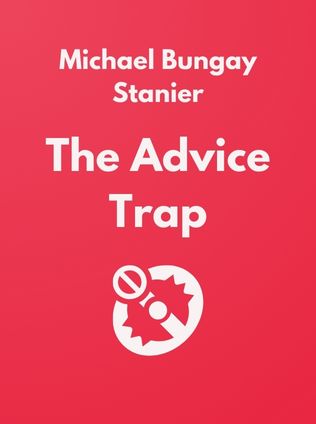
The Advice Trap
Be Humble, Stay Curious & Change the Way You Lead Forever
By Michael Bungay Stanier
Published 02/2020
About the Author
Michael Bungay Stanier is a luminary in the field of leadership coaching, celebrated for his ability to distill complex management concepts into actionable insights. Born in Australia and now residing in Canada, Stanier has spent decades honing his craft, culminating in his role as the founder of Box of Crayons, a company dedicated to helping organizations shift from advice-driven leadership to a more coaching-oriented culture. His work has resonated globally, earning him recognition as one of the leading voices in modern coaching.
Stanier is also the author of the best-selling book The Coaching Habit, which laid the groundwork for his philosophy that effective leadership is less about giving advice and more about asking the right questions. His follow-up book, The Advice Trap, builds on this foundation, challenging leaders to curb their instinct to advise and instead foster a culture of curiosity and inquiry. Stanier's writing is characterized by a blend of wit, wisdom, and practical guidance, making his ideas accessible and immediately applicable to leaders at all levels.
Main Idea
The core premise of The Advice Trap is deceptively simple yet profoundly transformative: the best leaders are those who resist the urge to give advice. Instead of defaulting to providing solutions, effective leaders cultivate a habit of asking insightful questions that empower their teams to find their own answers. Stanier argues that while giving advice might feel helpful and satisfying in the moment, it often undermines the long-term growth and autonomy of the team. By shifting from an advice-driven approach to a coaching mindset, leaders can create environments where innovation, confidence, and accountability flourish.
Stanier's book is not just a critique of traditional leadership models; it is a practical guide to embracing a new way of thinking. He provides readers with strategies to break free from the "Advice Monster" within, a metaphor he uses to describe the compulsive need to offer advice. Through a combination of psychological insights, practical tools, and relatable examples, The Advice Trap offers a roadmap for leaders to develop a more effective, question-based approach to management.
Table of Contents
- Introduction: The Trap of Advice
- The Problem with Advice-Giving
- Understanding the Advice Habit
- Breaking the Advice Habit
- Think Like a Coach
- Focus on the Main Challenge
- Turning Habits into Lifestyle
- Conclusion: The Future of Leadership
Introduction: The Trap of Advice
In the opening chapter, Stanier sets the stage by addressing the central paradox of leadership: while giving advice is often seen as a key component of leadership, it can also be its greatest pitfall. He introduces the concept of the "Advice Monster," which symbolizes the almost instinctual need to offer solutions and recommendations. This chapter serves as a wake-up call for leaders, urging them to reflect on their own tendencies to advise and consider the impact this has on their teams.
"The Advice Monster has three personas: Tell-It, Save-It, and Control-It. These are the voices in our heads that drive us to offer advice, to rescue others, and to control the situation. But in doing so, we often disempower those around us." — Michael Bungay Stanier
Stanier emphasizes that the first step in escaping the Advice Trap is recognizing its existence. Leaders must become aware of the moments when they are tempted to jump in with advice and instead pause to consider whether offering advice is truly the most helpful response. This chapter sets the tone for the rest of the book, challenging readers to rethink their assumptions about leadership and effectiveness.
The Problem with Advice-Giving
In this chapter, Stanier delves deeper into the issues that arise from an advice-centric approach to leadership. He argues that while advice-giving might seem efficient, it often leads to several unintended consequences. First, it can create dependency, where team members come to rely on their leaders for solutions rather than developing their own problem-solving skills. Second, advice-giving can stifle creativity and innovation by narrowing the focus to a single solution—often the leader's preferred one—rather than exploring a range of possibilities.
Sign up for FREE and get access to 1,400+ books summaries.
You May Also Like
The Subtle Art of Not Giving a F*ck
A Counterintuitive Approach to Living a Good Life
By Mark MansonRich Dad Poor Dad
What the Rich Teach Their Kids About Money - That the Poor and Middle Class Do Not!
By Robert T. KiyosakiHow To Win Friends and Influence People
The All-Time Classic Manual Of People Skills
By Dale CarnegieQuiet: The Power of Introverts
The Power of Introverts in a World That Can't Stop Talking
By Susan Cain



















